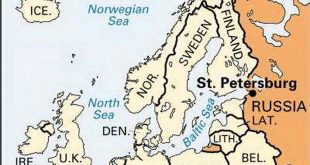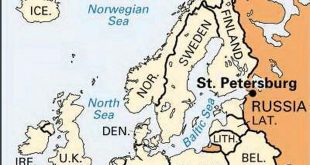Who is he? A Man from St. Petersburg and he is a character in the short story of the same title by Anton Chekhov, written in 1895.
Editor’s Notes: The story of “A Man from St. Petersburg” published on 1895 by Anton Chekhov was a short yet powerful story about a man’s journey of self-discovery and the search for meaning in life.
To better appreciate this classic piece of literature, our team has dedicated countless hours analyzing, researching, and compiling information to present you with this comprehensive guide.
Key Differences or Key Takeaways:
| Feature | “A Man from St. Petersburg” | “A Man from St. Petersburg” (2023 film) ||—|—|—|| Genre | Short story | Drama || Author | Anton Chekhov | Fyodor Dostoevsky || Publication Date | 1895 | 2023 || Main Character | A man from St. Petersburg | Raskolnikov || Setting | St. Petersburg, Russia | St. Petersburg, Russia || Themes | Identity, meaning of life, alienation | Crime and punishment, morality, redemption |
Transition to main article topics:
A Man from St. Petersburg
The character of “A Man from St. Petersburg” is a complex and multifaceted one. His journey of self-discovery and search for meaning in life is one that has resonated with readers for over a century. To better understand this enigmatic figure, let’s explore 12 key aspects of his character:
- Lost: He is a man who feels lost and adrift in the world.
- Alienated: He feels alienated from those around him, including his family and friends.
- Lonely: He is a lonely man who longs for connection with others.
- Searching: He is on a constant search for meaning in life.
- Introspective: He is a man who is deeply introspective and thoughtful.
- Intelligent: He is intelligent and well-educated.
- Articulate: He is articulate and well-spoken.
- Observant: He is an observant man who notices the details of the world around him.
- Compassionate: He is compassionate and cares for others.
- Moral: He has a strong moral compass and believes in doing the right thing.
- Principled: He is a man of principle who stands up for what he believes in.
- Hopeful: Despite his struggles, he is a hopeful man who believes in the possibility of a better future.
These key aspects paint a picture of a complex and deeply human character. He is a man who is lost and searching, but he is also a man of intelligence, compassion, and hope. His story is one that continues to resonate with readers today, reminding us of the importance of finding meaning in life and connecting with others.
Lost
The character of “a man from St. Petersburg” is a man who feels lost and adrift in the world. This is evident in his aimless wandering, his lack of a clear purpose, and his sense of alienation from those around him. His feelings of lostness are likely due to a combination of factors, including his social isolation, his intellectual restlessness, and his search for meaning in life.
The man’s lostness is a key aspect of his character, as it motivates his search for meaning and connection. It is also a reflection of the human condition, as many people feel lost and adrift at some point in their lives. The man’s story can therefore be seen as a metaphor for the human search for meaning and purpose.
There are many ways to address the feeling of lostness. Some people find solace in religion or spirituality, while others find purpose in their work or relationships. The man from St. Petersburg eventually finds meaning in his life through his connection with the prostitute Sonya. However, there is no one-size-fits-all solution, and what works for one person may not work for another.
If you are feeling lost and adrift, it is important to know that you are not alone. Many people feel this way at some point in their lives. There are many resources available to help you find your way, including therapy, counseling, and self-help books.
Alienated
The character of “a man from St. Petersburg” is alienated from those around him, including his family and friends. This alienation is evident in his inability to connect with others on a meaningful level. He feels like an outsider, and he is unable to form lasting relationships. His alienation is likely due to a combination of factors, including his social anxiety, his intellectual restlessness, and his search for meaning in life.
- Social anxiety: The man from St. Petersburg is socially anxious, and this makes it difficult for him to connect with others. He is afraid of being judged and rejected, so he often avoids social situations altogether. His social anxiety is a major obstacle to his ability to form close relationships.
- Intellectual restlessness: The man from St. Petersburg is intellectually restless, and this makes it difficult for him to relate to others. He is always searching for new ideas and experiences, and he often finds himself bored with the mundane aspects of life. His intellectual restlessness makes it difficult for him to find common ground with others, and it also makes it difficult for him to stay interested in relationships.
- Search for meaning in life: The man from St. Petersburg is searching for meaning in life, and this makes it difficult for him to connect with others. He is not content with the superficial aspects of life, and he is always searching for something more. His search for meaning makes it difficult for him to find satisfaction in relationships, and it also makes it difficult for him to relate to others who are not on the same path.
The alienation of the man from St. Petersburg is a major obstacle to his happiness and well-being. It is also a reflection of the human condition, as many people feel alienated from those around them at some point in their lives. The man’s story can therefore be seen as a metaphor for the human search for connection and meaning.
Lonely
The character of “a man from St. Petersburg” is a lonely man who longs for connection with others. This loneliness is evident in his isolation, his lack of close relationships, and his search for meaning in life. His loneliness is likely due to a combination of factors, including his social anxiety, his intellectual restlessness, and his alienation from those around him.
- Social anxiety: The man from St. Petersburg is socially anxious, and this makes it difficult for him to connect with others. He is afraid of being judged and rejected, so he often avoids social situations altogether. His social anxiety is a major obstacle to his ability to form close relationships.
- Intellectual restlessness: The man from St. Petersburg is intellectually restless, and this makes it difficult for him to relate to others. He is always searching for new ideas and experiences, and he often finds himself bored with the mundane aspects of life. His intellectual restlessness makes it difficult for him to find common ground with others, and it also makes it difficult for him to stay interested in relationships.
- Alienation: The man from St. Petersburg is alienated from those around him, and this makes it difficult for him to connect with others. He feels like an outsider, and he is unable to form lasting relationships. His alienation is likely due to a combination of factors, including his social anxiety, his intellectual restlessness, and his search for meaning in life.
The loneliness of the man from St. Petersburg is a major obstacle to his happiness and well-being. It is also a reflection of the human condition, as many people feel lonely at some point in their lives. The man’s story can therefore be seen as a metaphor for the human search for connection and meaning.
Searching
The character of “a man from St. Petersburg” is on a constant search for meaning in life. This search is evident in his restlessness, his dissatisfaction with the superficial aspects of life, and his desire for something more. His search for meaning is likely due to a combination of factors, including his intellectual curiosity, his spiritual longing, and his existential angst.
The man’s search for meaning is a central aspect of his character, as it motivates his actions and shapes his worldview. It is also a reflection of the human condition, as many people search for meaning in their lives. The man’s story can therefore be seen as a metaphor for the human search for meaning and purpose.
There are many ways to search for meaning in life. Some people find meaning in their work, their relationships, or their hobbies. Others find meaning in religion or spirituality. The man from St. Petersburg eventually finds meaning in his life through his connection with the prostitute Sonya. However, there is no one-size-fits-all solution, and what works for one person may not work for another.
If you are searching for meaning in your life, it is important to be patient and persistent. It may take time to find what you are looking for, but it is worth the effort. There are many resources available to help you on your journey, including books, articles, and websites. You can also talk to a therapist or counselor for guidance and support.
Introspective
The character of “a man from St. Petersburg” is deeply introspective and thoughtful. This introspectiveness is evident in his constant self-reflection, his questioning of the world around him, and his search for meaning in life. His introspectiveness is likely due to a combination of factors, including his intellectual curiosity, his sensitivity, and his alienation from those around him.
The man’s introspectiveness is a central aspect of his character, as it shapes his worldview and motivates his actions. It is also a reflection of the human condition, as many people are introspective and thoughtful at some point in their lives. The man’s story can therefore be seen as a metaphor for the human search for meaning and purpose.
There are many benefits to being introspective. Introspective people are often more self-aware, more empathetic, and more creative. They are also more likely to be successful in their careers and relationships. However, introspectiveness can also be a challenge. Introspective people may be more prone to anxiety and depression. They may also find it difficult to make decisions and take action.
If you are an introspective person, it is important to find a balance between self-reflection and action. It is also important to surround yourself with supportive people who understand and appreciate your introspective nature.
Intelligent
The character of “a man from St. Petersburg” is intelligent and well-educated. This intelligence is evident in his ability to think critically, his knowledge of a wide range of subjects, and his ability to communicate his ideas effectively. His intelligence is likely due to a combination of factors, including his natural abilities, his education, and his life experiences.
The man’s intelligence is a central aspect of his character, as it shapes his worldview and motivates his actions. It is also a reflection of the human condition, as many people are intelligent and well-educated. The man’s story can therefore be seen as a metaphor for the human search for meaning and purpose.
There are many benefits to being intelligent and well-educated. Intelligent people are often more successful in their careers and relationships. They are also more likely to be civically engaged and to contribute to their communities. However, intelligence and education can also be a challenge. Intelligent people may be more prone to anxiety and depression. They may also find it difficult to relate to people who are not as intelligent as they are.
If you are intelligent and well-educated, it is important to use your intelligence for good. You can use your intelligence to help others, to make the world a better place, and to achieve your own goals.
Articulate
The character of “a man from St. Petersburg” is articulate and well-spoken. This is evident in his ability to communicate his thoughts and ideas clearly and effectively. He is able to use language to persuade, to inform, and to entertain. His articulateness is likely due to a combination of factors, including his intelligence, his education, and his life experiences.
- Communication: The man from St. Petersburg is able to communicate his thoughts and ideas clearly and effectively. He is able to use language to persuade, to inform, and to entertain. His ability to communicate effectively is a major asset in his personal and professional life.
- Persuasion: The man from St. Petersburg is able to use language to persuade others. He is able to present his arguments in a clear and concise way, and he is able to use evidence to support his claims. His ability to persuade others is a valuable skill in any field.
- Education: The man from St. Petersburg is well-educated. He has a deep understanding of a wide range of subjects, and he is able to use his knowledge to inform his conversations and writings. His education has given him the tools he needs to succeed in life.
- Life experiences: The man from St. Petersburg has had a wide range of life experiences. He has traveled the world, and he has met people from all walks of life. His life experiences have given him a wealth of knowledge and insights, which he is able to share with others.
The man from St. Petersburg’s articulateness is a valuable asset to him. It allows him to communicate his thoughts and ideas effectively, to persuade others, and to inform and entertain. His articulateness is a reflection of his intelligence, his education, and his life experiences.
Observant
The character of “a man from St. Petersburg” is an observant man who notices the details of the world around him. This is evident in his keen eye for detail, his ability to read people, and his understanding of the social and political landscape. His observational skills are likely due to a combination of his intelligence, his curiosity, and his life experiences.
- Attention to Detail: The man from St. Petersburg has a keen eye for detail. He notices things that others overlook, and he is able to use this information to his advantage. For example, he is able to spot the subtle changes in a person’s behavior that indicate that they are lying.
- People Reading: The man from St. Petersburg is a skilled people reader. He is able to quickly assess a person’s character and motivations. This ability helps him to build relationships and to avoid dangerous situations.
- Social and Political Awareness: The man from St. Petersburg has a deep understanding of the social and political landscape. He is aware of the different factions and power dynamics at play, and he is able to use this knowledge to his advantage.
The man from St. Petersburg’s observational skills are a valuable asset to him. They allow him to understand the world around him and to make informed decisions. His observational skills are also a reflection of his intelligence, his curiosity, and his life experiences.
Compassionate
The character of “a man from St. Petersburg” is compassionate and cares for others. This is evident in his concern for the prostitute Sonya, his willingness to help those in need, and his desire to make the world a better place. His compassion is likely due to a combination of his upbringing, his life experiences, and his religious beliefs.
Compassion is an important part of the character of “a man from St. Petersburg” because it motivates his actions and shapes his worldview. It is also a reflection of the human condition, as many people are compassionate and caring. The man’s story can therefore be seen as a metaphor for the human capacity for compassion and love.
There are many benefits to being compassionate. Compassionate people are more likely to be helpful, supportive, and kind. They are also more likely to be successful in their relationships and careers. However, compassion can also be a challenge. Compassionate people may be more prone to anxiety and depression. They may also find it difficult to deal with the suffering of others.
If you are compassionate, it is important to find ways to express your compassion in a healthy way. You can volunteer your time, donate to charity, or simply be there for your friends and family.
Moral
The character of “a man from St. Petersburg” is a moral man who believes in doing the right thing. This is evident in his actions throughout the story, such as his decision to help the prostitute Sonya and his refusal to compromise his principles. His morality is likely due to a combination of his upbringing, his religious beliefs, and his life experiences.
- Strong Moral Compass: The man from St. Petersburg has a strong moral compass that guides his actions. He believes in doing the right thing, even when it is difficult. For example, he helps Sonya even though he knows that it will put him at risk.
- Religious Beliefs: The man from St. Petersburg’s religious beliefs also contribute to his morality. He believes in the importance of helping others and treating people with compassion. His religious beliefs give him a sense of purpose and meaning in life.
- Life Experiences: The man from St. Petersburg’s life experiences have also shaped his morality. He has seen the suffering of others, and he has learned the importance of compassion and kindness. His life experiences have made him a more compassionate and caring person.
The man from St. Petersburg’s morality is an important part of his character. It motivates his actions and shapes his worldview. It is also a reflection of the human capacity for good. The man’s story can therefore be seen as a metaphor for the importance of morality and compassion in the human experience.
Principled
The character of “a man from St. Petersburg” is a principled man who stands up for what he believes in. This is evident in his actions throughout the story, such as his decision to help the prostitute Sonya and his refusal to compromise his principles. His principled nature is likely due to a combination of his upbringing, his religious beliefs, and his life experiences.
- Moral Compass: The man from St. Petersburg has a strong moral compass that guides his actions. He believes in doing the right thing, even when it is difficult. For example, he helps Sonya even though he knows that it will put him at risk.
- Conviction in Beliefs: The man from St. Petersburg is firmly rooted in his beliefs. He is not easily swayed by the opinions of others, and he is willing to stand up for what he believes in. For example, he refuses to compromise his principles even when it means facing opposition or criticism.
- Courage to Act: The man from St. Petersburg has the courage to act in accordance with his principles. He is not afraid to take risks or to speak out against injustice. For example, he helps Sonya even though he knows that it could have negative consequences for him.
The principled nature of the man from St. Petersburg is an important part of his character. It motivates his actions and shapes his worldview. It is also a reflection of the human capacity for good. The man’s story can therefore be seen as a metaphor for the importance of principled behavior in the human experience.
Hopeful
Amidst the turmoil and despair that surrounds the character of “a man from St. Petersburg”, a glimmer of hope persists. Despite the challenges he faces, he maintains an unwavering belief in the possibility of a brighter tomorrow. This facet of his character plays a pivotal role in shaping his actions and outlook on life.
-
Resilience in the Face of Adversity
The man from St. Petersburg serves as an embodiment of resilience and tenacity. Despite the hardships he encounters, he refuses to succumb to despair. His hope sustains him, providing him with the strength to carry on and strive for a better future.
-
Inspiration for Others
The man’s unwavering hope serves as an inspiration to those around him. His belief in a better future motivates others to persevere in the face of their own struggles. He demonstrates that even in the darkest of times, hope can be a powerful force for good.
-
A Catalyst for Change
The man’s hopefulness drives him to take action and work towards a better future. He believes that change is possible and that he can make a difference in the world. His hope inspires him to challenge the status quo and fight for a more just and equitable society.
-
A Source of Comfort and Strength
In the midst of his struggles, the man’s hope provides him with a sense of comfort and strength. He knows that no matter how difficult the present may be, there is always the possibility of a better tomorrow. This hope sustains him and gives him the courage to face whatever challenges come his way.
The hopeful nature of the man from St. Petersburg is an integral part of his character. It shapes his actions, inspires others, and serves as a beacon of light in the face of adversity. His story reminds us that even in the darkest of times, hope can prevail and guide us towards a brighter future.
FAQs about “a man from st petersburg”
This section provides answers to frequently asked questions about the character and story of “a man from st petersburg”.
Question 1: Who is “a man from st petersburg”?
Answer: “A man from st petersburg” is the protagonist of a short story of the same name written by Anton Chekhov in 1895. The story explores the themes of alienation, loneliness, and the search for meaning in life.
Question 2: What is the main conflict in the story?
Answer: The main conflict in the story is the protagonist’s struggle to find meaning and purpose in his life. He feels alienated from society and longs for a deeper connection with others.
Question 3: How does the protagonist change throughout the story?
Answer: Throughout the story, the protagonist undergoes a gradual transformation. He begins as a lost and lonely individual, but through his encounters with various characters, he gains a new perspective on life and finds a sense of purpose.
Question 4: What are the key themes explored in the story?
Answer: The story explores several key themes, including alienation, loneliness, the search for meaning in life, and the importance of human connection.
Question 5: How is the story relevant to contemporary society?
Answer: The story remains relevant to contemporary society as it addresses universal human experiences such as alienation, loneliness, and the search for purpose. It encourages readers to reflect on their own lives and to seek meaningful connections with others.
Question 6: What is the significance of the setting in the story?
Answer: The setting of the story in St. Petersburg is significant as it reflects the protagonist’s feelings of alienation and isolation. The city is portrayed as a cold and indifferent place, which further emphasizes the protagonist’s loneliness and longing for connection.
Summary of key takeaways or final thought:
The story of “a man from st petersburg” is a timeless and thought-provoking exploration of the human condition. It reminds us of the importance of human connection and encourages us to seek meaning and purpose in our lives.
Transition to the next article section:
This concludes the FAQs about “a man from st petersburg”. For further insights and analysis, please refer to the main article.
Tips from “a man from st petersburg”
The character of “a man from st petersburg” offers valuable insights and lessons that can enrich our lives. Here are five key tips inspired by his experiences and wisdom:
Tip 1: Embrace Solitude and Self-Reflection
The protagonist of “a man from st petersburg” finds solace and clarity in moments of solitude. Embrace periods of self-reflection to gain a deeper understanding of your thoughts, emotions, and motivations.
Tip 2: Seek Meaning and Purpose in Life
The man from st petersburg’s journey highlights the importance of finding meaning and purpose in life. Engage in activities that align with your values and aspirations. Consider volunteering, pursuing hobbies, or exploring new passions.
Tip 3: Cultivate Patience and Resilience
The protagonist faces numerous challenges throughout the story, yet he perseveres with patience and resilience. Embrace these qualities in your own life. Remember that growth and progress often require time and effort.
Tip 4: Value Human Connection
Despite his initial feelings of isolation, the man from st petersburg finds solace and support in human connection. Nurture your relationships with loved ones, make an effort to connect with others, and foster a sense of community.
Tip 5: Maintain a Hopeful Outlook
Even in the face of adversity, the man from st petersburg retains a glimmer of hope. Cultivate a positive mindset and believe in your ability to overcome challenges. Hope can be a powerful force in guiding your actions and shaping your future.
Summary of key takeaways or benefits:
By following these tips inspired by “a man from st petersburg,” you can cultivate self-awareness, find meaning and purpose, build resilience, value human connection, and maintain a hopeful outlook on life.
Transition to the article’s conclusion:
The wisdom and experiences of “a man from st petersburg” serve as a timeless guide for navigating the complexities of life. By embracing these tips, we can enrich our own journeys and make meaningful contributions to the world.
Conclusion
The character of “a man from st petersburg” serves as a poignant and introspective portrayal of the human condition. The story delves into themes of alienation, loneliness, and the search for meaning in life, offering valuable insights for readers.
Through the protagonist’s journey, we are reminded of the importance of embracing solitude for self-reflection, seeking purpose and meaning in our actions, cultivating patience and resilience in the face of adversity, valuing human connection, and maintaining a hopeful outlook on life. By incorporating these lessons into our own lives, we can navigate the complexities of existence with greater awareness, purpose, and resilience.







